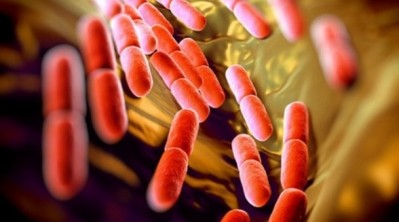Study details how gut microbiome communicates with immune system

The team believes the production of short-chain fatty acids and secondary bile acids by the microbiome influences the production of P-glycoprotein (P-gp), which allows the intestine to communicate with the immune system through the gut wall.
“The upshot of this research is that we now know the specific molecules produced by the microbiome bacteria that are linked to P-gp, and hence, a healthy intestine,” explains Merran Dunford, Postgraduate Research Student at the University’s Department of Pharmacy & Pharmacology.
“These molecules work in concert to stimulate P-gp to increase the release of endocannabinoid molecules, which suppress intestinal inflammation.”
P-gp expression
Along with colleagues from the University of Massachusetts Chan Medical School, the team began a series of in vitro and in vivo studies using mouse models as well as human subject sample analysis.
The in vivo models focused on microbiota perturbation that include antibiotic treatment and stratification, as well as reconstitution of germ-free mice.
The research team also performed metagenomic sequencing to identify the bacterial community required and sufficient for P-gp induction in vivo.
Additionally, through reductionist approaches, the team were able to demonstrate short-chain fatty acids and secondary bile acids acted to induce functional P-gp in vitro.
Additionally, through collection of intestinal samples from a cohort of patients with UC, the team found reduced P-gp expression and function vs. healthy control subjects.
“We have identified a “functional core” microbiome of the intestinal gut community, specifically genera within the Clostridia and Bacilli classes, that is necessary and sufficient for P-gp induction in the intestinal epithelium in mouse models,” the paper writes.
Potential future treatments
“In patients suffering from UC, we find diminished P-gp expression coupled to the reduction of epithelial-derived anti-inflammatory endocannabinoids and luminal content (e.g., microbes or their metabolites) with a reduced capability to induce P-gp expression.
“These studies identify a mechanistic link between the commensal microbiota in driving functional P-gp expression that is critical to maintain intestinal homeostasis through suppression of neutrophil transmigration.”
The research builds on the team’s earlier research that showed how the anti-inflammatory P-gp pathway is constantly balanced with a pro-inflammatory process. In inflammatory diseases, this balance is poorly managed.
While current treatments can reduce inflammation and symptoms, there is nothing available today to treat the underlying disease.
Potential future treatments could include the delivery of specific bacteria or bacterial products to a person’s gut, or dietary changes that would support a microbiome to promote or sustain P-gp expression in the intestine, thereby protecting against unwanted inflammation.
Much to explore
“We are excited to find that not only is there a link between the gut microbiome and P-gp regulation in the intestine, but that two classes of microbial molecules actually work together to trigger expression of P-gp,” explains Sage Foley, study team member, who is based at the University of Massachusetts Chan Medical School.
“This highlights the importance of a functioning core microbial community to have maximal impact on the human body.
“While even within an individual the relative abundance of microbes can fluctuate, we’re beginning to understand the importance of nourishing the microbial community as a whole,” adds Foley, a Doctoral Candidate, Immunology and Microbiology Program at the University.
“Though there is still much to explore, we suspect this may be possible through changes to the diet or through the delivery of groupings of microbes.”
Ruth Wakeman, Director of services, advocacy and evidence at Crohn’s & Colitis UK, welcomed research that helps increase understanding of how environmental factors, diet and gut microorganisms may influence conditions such as Crohn’s and colitis.
“We hope that research such as this will lead to new and improved methods of managing the conditions in the future,” she adds.
Source: Microbiome
Published online: doi: 10.1186/s40168-021-01137-3
“Gut microbiota regulation of P-glycoprotein in the intestinal epithelium in maintenance of homeostasis.”
Authors: Sage Foley et al.















